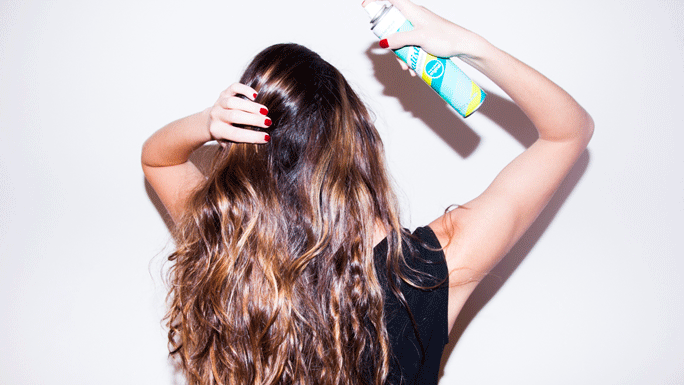
21 Mar What is Dry Shampoo?
Essentially it’s a powder or fast-drying spray that provides a water-free option for cleansing your hair. Dry shampoo absorbs excess sebum and other oils from your roots, freshens up the rest of your hair and leaves it smelling fresher.
Why Do People Use Dry Shampoo?
• To be able to shampoo less frequently. Why is that an issue? Frequent shampooing can strip moisture from certain hair types (coarse, curly, thick, fragile, etc.) so if your fall in to one of those categories, it’s best to shampoo less. Dry shampoo lets you go longer without suffering matted or oily roots.
• To stretch out a blow-out. You invest in a beautiful styling service and of course you want it to last as long as possible before shampooing. You can easily add a few days to your blow-out with dry shampoo.
• To eliminate odour. Your hair may not look or feel dirty, but perhaps hanging out with all the smokers at the party you attended last night resulted in some pretty stale-smelling strands this a.m. Many dry shampoo formulas feature a pleasant fragrance to instantly refresh your hair.
• To add volume. This is one of the best bonuses of a dry shampoo. Not only does it make your hair look, feel and smell fresher and cleaner, it also gives you a real boost! Directing a powder or spray dry shampoo at your roots immediately adds volume and fullness—as if you’ve just blown-out your hair!
• To refresh a style or curls. Dry shampoo isn’t just for an oily scalp. Mist the rest of your hair lightly, grab your brush and blow dryer and do a quick re-style to perk up droopy waves or curls.
• To save time. Let’s just say you’re going to be late for work and there’s no time for a proper shampoo and blow-dry, dry shampoo is your new best friend.
• To add texture. Silky hair is lovely and desirable…most of the time. Sometimes, though, a little bit of grit is helpful—like if you’re doing a messy bun or a cool, Pinterest-worthy braid and need to form and hold a textured finish.
WARNING!!!!
Overusing dry shampoo can lead to a build-up on the scalp which can result in blocked pores, pimples and painful cysts. And it doesn’t end there.
Once the scalp is suffering from a build-up of dry shampoo (we have to admit, there have been times we’ve used it three days in a row), the hair itself begins to become affected and hair growth is significantly impaired.
people who suffer from dandruff may find their condition worsens with the use of dry shampoo as the scalp is already depleted of natural oils (and the dry shampoo acts to soak up any moisture in the hair).
The term “dry shampoo” is confusing because it has nothing to do with cleaning hair in the same way as traditional shampoo. You’re adding a formulation of dry powder that absorbs oil
Plus, even if your hair feels — and looks — cleaner after a dry shampoo spritz, it isn’t, and you still need to wash it. “Using [dry shampoo] may cause people not to wash their scalp and remove oil and build-up. Maybe not every day, but you want to do some type of regular washing of scalp and hair. Dry shampoo was meant as a ‘freshen up’ product, never as a replacement for regular shampoo and conditioning.
IT IS WISE USE IT SPARINGLY.
The old adage about “too much of a good thing” applies to dry shampoo. After you’ve used it three times, it’s probably time to really wash your hair
If this information has been informative and beneficial please leave a comment below and feel free to share it, thank you .


